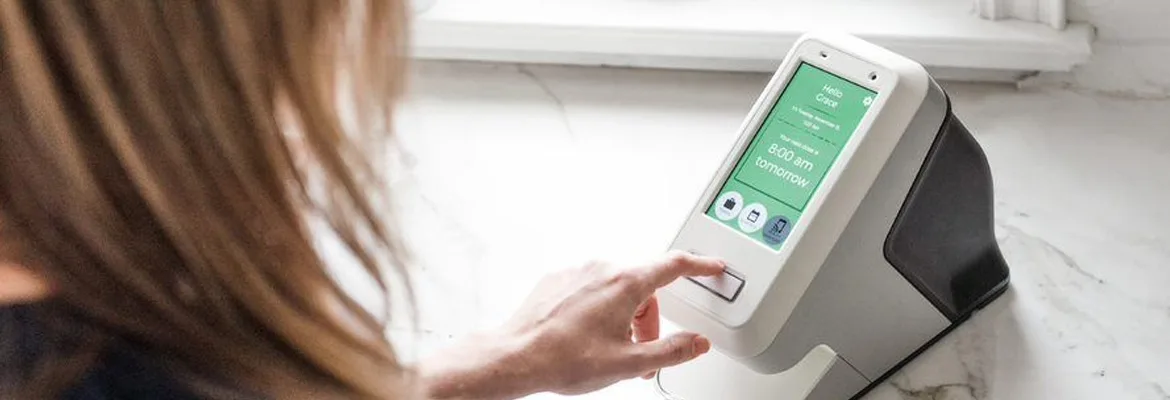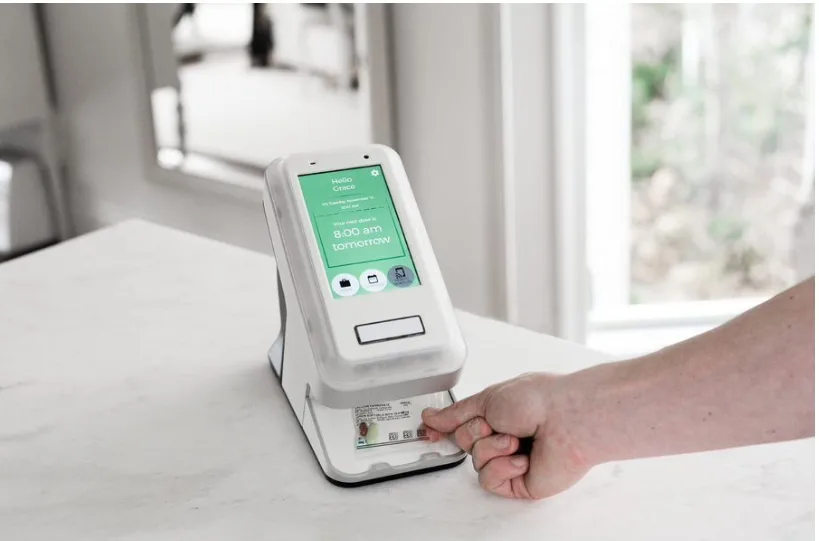
Smart medication management for seniors made simple
Other · Mar 1, 2019
There’s an old proverb that claims, “Necessity is the mother of invention.” For Canadian healthcare technology company, AceAge Inc., this sentiment is particularly true. After watching his grandfather repeatedly end up in the hospital for not taking his medications correctly, AceAge’s CEO, Spencer Waugh, saw the need for a solution that completely automates medication management and takes the onus off the individual for remembering prescription schedules and doses.
AceAge has just launched Karie, a connected medication management appliance that automatically organizes, schedules, monitors, and dispenses prescription medications, ensuring patients are taking the right pills at the right time. With Canada’s demographics experiencing a fundamental shift, the release of Karie couldn’t be timelier, or more vital.
Karie incorporates design and technology built around the user
The
Government of Canada’s
Action for Seniors
report
states that, “in 2012, almost one in seven Canadians was a senior; by 2030, that number will jump to nearly one in four.” Seniors tend to have a higher number of chronic health conditions than younger patients, requiring more medications to treat those conditions. In fact, according to a study by the Canadian Institute for Health Information
, nearly two-thirds of seniors take five or more medications. Regardless of patient age, remembering to take multiple medications at different times of day is a feat for anyone. For seniors, however, it can be particularly problematic because of declining cognitive functions and lack of in-home support.Before founding AceAge, Waugh conducted his own research to see if there was a way to help his grandfather better manage his medications. Beyond the traditional pillbox, what he found was over 400 different smartphone applications, all purporting to help patients keep track of and remember to take their prescriptions. However, Waugh noticed a couple of glaring issues. For one thing, the applications still required the user to manually input information and schedules. Even more problematic was the fact that mobile technology is not intuitive for many seniors.
Waugh thought he had found a solution for his grandfather when he discovered multi-dose medication packages - long strips of individual pouches that are pre-filled at the pharmacy with the correct doses of medication. Although this seemed like a good way to keep his grandfather organized, it wasn’t long before another hospital visit was needed. According to Waugh, “That gave me an “aha!” moment, that organization was just one piece of the puzzle. There still needed to be some kind of automatic reminder to take the medication and if the patient doesn’t respond, then a notification should be automatically sent to a family member or a caregiver.”
Working with his future brother-in-law, who at the time was finishing a technical degree, Waugh conceptualized a connected medication dispenser utilizing the multi-dose prescription pouches, and built the first iteration of the hardware. Many redesigns, extensive testing and user trials later and Karie was ready to go to market.
One of the biggest appeals of the countertop device is its ease-of-use and simplicity. According to Waugh, “It doesn’t matter what your medication regimen is: you can be on three pills or 20 pills. What Karie does is reduce the entire medication management to a single load action. You just pop the pre-filled multi-dose package cartridge into the back of the device. When it’s time to take your medication, a visual and audible signal alerts you and with the press of a button, the correct dose is dispensed. We took something complex and made it very simple through design and technology built around the user.”

Helping seniors age in place independently and confidently
With an aging population requiring multiple medications to maintain a daily quality of life, it’s becoming critical for Canada’s health sector to find ways to improve patient care while reducing costs. One way is by supporting patient autonomy and enabling seniors to live in their homes for longer.
As Waugh believes, “We have to, as a country, adopt technology that will allow people to maintain their independence and age in place, in the comfort of home. Karie, as a device, simply enables people to manage their medications properly so they can confidently care for themselves longer.”
For Karie to be successful, AceAge believes it has to eliminate human error, which is why designing a smart device was imperative for its ease of use. Karie contains a SIM card that securely connects the device to TELUS’ global IoT network. When the device is plugged into a power outlet, it automatically connects to the patient’s pharmacy, loads the prescription schedule, signals to the patient when the time has come to take their medications, and messages a caregiver if there are any issues.
The reason Karie connects to the cellular network and not via Wi-Fi is to eliminate the need for the user to manually set up or manage the connection. Although Wi-Fi connectivity is included as a backup, using a TELUS SIM card has enabled Karie to be plug-and-go ready and connect reliably from virtually anywhere, at anytime.

TELUS global IoT connectivity enables Karie to travel and reach more users
In his early discussions with TELUS, Waugh didn’t realize that TELUS also supported IoT connectivity outside Canada. It was when he brought up active seniors travelling with their Karie devices that Waugh was introduced to TELUS’ global reach. Waugh couldn’t believe it: “I was like, hold the phone! You have connectivity in 200 different countries under one SIM card? That’s amazing. I assumed that expanding to new markets would require separate contracts with the local cellular providers.”
Now, thanks to the partnership with TELUS, AceAge can look forward to providing their customers in Canada and around the world with seamless connectivity and no additional roaming charges.
An invaluable partnership that extends beyond technology
Not only does the future look bright for AceAge Inc., but with Karie clinical trials showing a 300% increase in medication adherence, patient health outcomes look set to drastically improve as well.
AceAge is aiming to have tens of thousands of TELUS IoT powered Karie devices in use in homes and care facilities by the end of the year, providing consistent, reliable service to those who need it most.
For more information on TELUS IoT Connectivity visit
telus.com/iot
Authored by:
Johnny Ramoutar
TELUS Business


